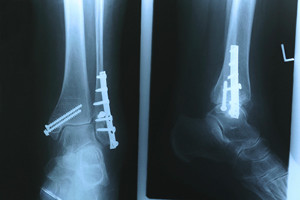What Are Stress Fractures?
Monday, 13 July 2020 00:00 A stress fracture is a tiny crack in the bone that occurs because too much stress was placed on the foot. Stress fractures don’t usually occur because of a particular trauma, but rather they gradually develop over time. Some causes of stress fractures include repetitive high-impact activities, increased training, low bone density, and poor nutrition. Most stress fractures can be diagnosed with x-rays, but an MRI or CT scan may be necessary for smaller and newer stress fractures. Upon the discovery of a stress fracture, a cast or walking boot may be necessary. Generally, stress fractures take around 4-6 weeks to heal, and a slow return to your normal activity will be needed. If you are feeling a gradual increase of pain in the feet that you believe may be a stress fracture, please consult with a podiatrist for a proper diagnosis.
A stress fracture is a tiny crack in the bone that occurs because too much stress was placed on the foot. Stress fractures don’t usually occur because of a particular trauma, but rather they gradually develop over time. Some causes of stress fractures include repetitive high-impact activities, increased training, low bone density, and poor nutrition. Most stress fractures can be diagnosed with x-rays, but an MRI or CT scan may be necessary for smaller and newer stress fractures. Upon the discovery of a stress fracture, a cast or walking boot may be necessary. Generally, stress fractures take around 4-6 weeks to heal, and a slow return to your normal activity will be needed. If you are feeling a gradual increase of pain in the feet that you believe may be a stress fracture, please consult with a podiatrist for a proper diagnosis.
Stress fractures occur when there is a tiny crack within a bone. To learn more, contact Dr. Ronald K. Olm from Grand Traverse Foot & Ankle Center. Our doctor can provide the care you need to keep you pain free and on your feet.
How Are They Caused?
Stress fractures are the result of repetitive force being placed on the bone. Since the lower leg and feet often carry most of the body’s weight, stress fractures are likely to occur in these areas. If you rush into a new exercise, you are more likely to develop a stress fracture since you are starting too much, too soon. Pain resulting from stress fractures may go unnoticed at first, however it may start to worsen over time.
Risk Factors
- Gender – They are more commonly found in women compared to men.
- Foot Problems – People with unusual arches in their feet are more likely to develop stress fractures.
- Certain Sports – Dancers, gymnasts, tennis players, runners, and basketball players are more likely to develop stress fractures.
- Lack of Nutrients – A lack of vitamin D and calcium may weaken the bones and make you more prone to stress fractures
- Weak Bones – Osteoporosis can weaken the bones therefore resulting in stress fractures
Stress fractures do not always heal properly, so it is important that you seek help from a podiatrist if you suspect you may have one. Ignoring your stress fracture may cause it to worsen, and you may develop chronic pain as well as additional fractures.
If you have any questions, please feel free to contact one of our offices located in Traverse City and Kalkaska, MI . We offer the newest diagnostic and treatment technologies for all your foot care needs.





